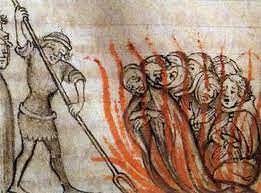“In an age when so many struggle to find meaning, a community formed through a set of commonly held beliefs can form a stronger bond than one formed through antipathy towards rejected beliefs (p.14).” — Widening the Circle of Concern (2020 Report of the UUA Commission on Institutional Change)
The theological roots of Unitarian Universalism are grounded in two great heresies: the heresy of Universalism (no one is lost forever, all are saved) and the heresy of Unitarianism (there is no biblical support for the idea of a triune God). The word ‘heretic’ comes from the Greek word for ‘choice.’ Unitarian Universalists, both those raised as UUs and those ‘come-inners’ who were raised in a different faith, CHOOSE our faith. In this sense, we are all heretics. But too often, in explaining our theology, we fall on negatives: “we don’t believe X” and “we don’t believe Y.” How can we work toward commonly held beliefs and practices while honoring our heretical heritage?

